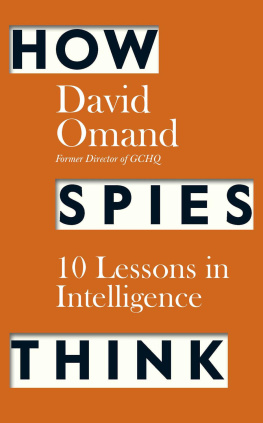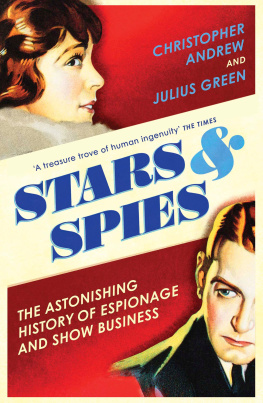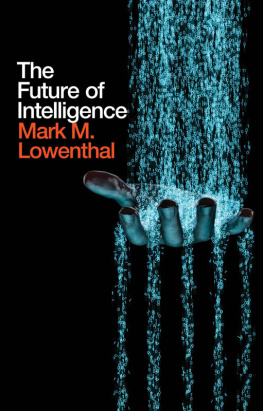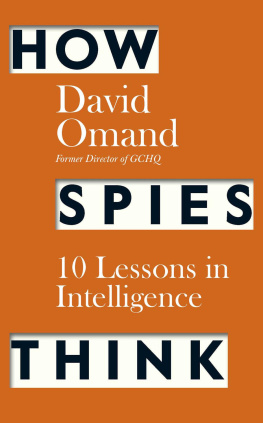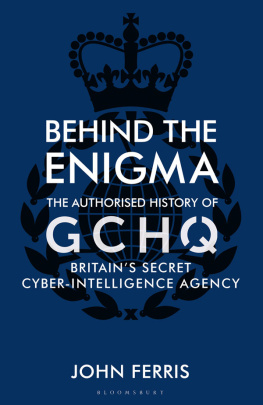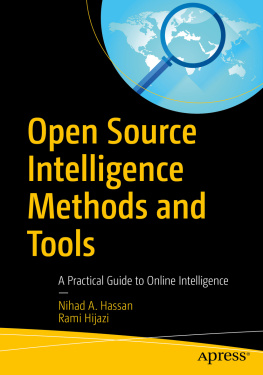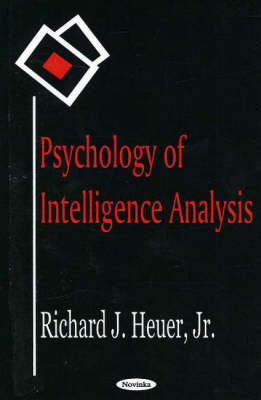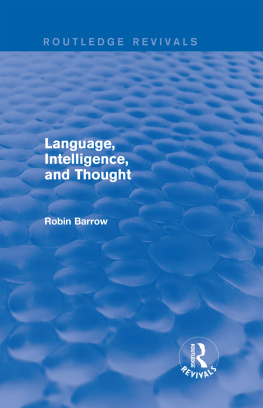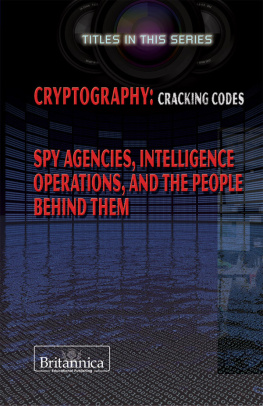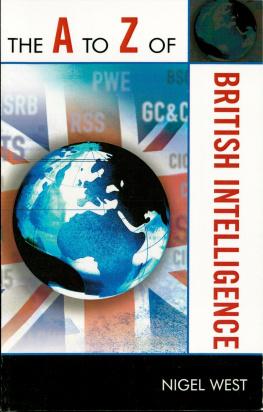
David Omand
HOW SPIES THINK
Ten Lessons in Intelligence

Contents
About the Author
David Omand was the first UK Security and Intelligence Coordinator, responsible to the Prime Minister for the professional health of the intelligence community, national counter-terrorism strategy and homeland security. He served for seven years on the Joint Intelligence Committee. He was Permanent Secretary of the Home Office from 1997 to 2000, and before that Director of GCHQ.
For Keir, Robert, Beatrice and Ada, in the hope that you will grow up in a better world
Introduction
Why we need these lessons in seeking independence of mind, honesty and integrity
Westminster, March 1982. This is very serious, isnt it? said Margaret Thatcher. She frowned and looked up from the intelligence reports I had handed her. Yes, Prime Minister, I replied, this intelligence can only be read one way: the Argentine Junta are in the final stages of preparing to invade the Falkland Islands, very likely this coming Saturday.
It was the afternoon of Wednesday, 31 March 1982.
I was the Principal Private Secretary to the Defence Secretary, John Nott. We were in his room in the House of Commons drafting a speech when an officer from the Defence Intelligence Staff rushed down Whitehall with a locked pouch containing several distinctive folders. I knew immediately from the red diagonal crosses on their dark covers that they contained top secret material with its own special codeword (UMBRA), denoting that they came from the Government Communications Headquarters (GCHQ).
The folders contained decrypted intercepts of Argentine naval communications. The messages showed that an Argentine submarine had been deployed on covert reconnaissance around the Falklands capital, Port Stanley, and that the Argentine Fleet, which had been on exercises, was reassembling. A further intercept referred to a task force said to be due to arrive at an unstated destination in the early hours of Friday, 2 April. From their analysis of the coordinates of the naval vessels, GCHQ had concluded that its destination could only be Port Stanley.
John Nott and I looked at each other with but one thought, loss of the Falkland Islands would bring a major existential crisis for the government of Margaret Thatcher: the Prime Minister must be told at once. We hurried down the Commons corridor to her room and burst in on her.
The last assessment she had received from the UK Joint Intelligence Committee (JIC) had told her that Argentina did not want to use force to secure its claim to the sovereignty of the Falkland Islands. However, the JIC had warned that if there was highly provocative action by the British towards Argentine nationals, who had landed illegally on the British South Atlantic island of South Georgia, then the Junta might use this as a pretext for action. Since the UK had no intention of provoking the Junta, the assessment was wrongly interpreted in Whitehall as reassuring. That made the fresh intelligence reports all the more dramatic. It was the first indication that the Argentine Junta was ready to use force to impose its claim.
The importance for us of being able to reason
The shock of seeing the nation suddenly pitched into the Falklands crisis is still deeply etched in my memory. It demonstrated to me the impact that errors in thinking can have. This is as true for all life as it is for national statecraft. My objective in writing this book therefore is an ambitious one: I want to empower people to make better decisions by learning how intelligence analysts think. I will provide lessons from our past to show how we can know more, explain more and anticipate more about what we face in the extraordinary age we now live in.
There are important life lessons in seeing how intelligence analysts reason. By learning what intelligence analysts do when they tackle problems, by observing them in real cases from recent history, we will learn how they order their thoughts and how they distinguish the likely from the unlikely and thus make better judgements. We will learn how to test alternative explanations methodically and judge how far we need to change our minds as new information arrives. Sound thinkers try to understand how their unconscious feelings as individuals, as members of a group and within an institution might affect their judgement. We will also see how we can fall victim to conspiracy thinking and how we can be taken in by deliberate deception.
We all face decisions and choices, at home, at work, at play. Today we have less and less time to make up our minds than ever before. We are in the digital age, bombarded with contradictory, false and confusing information from more sources than ever. Information is all around us and we feel compelled to respond at its speed. There are influential forces at play ranged against us pushing specific messages and opinions through social media. Overwhelmed by all this information, are we less, or more, ignorant than in previous times? Today more than ever, we need those lessons from the past.
Looking over the shoulder of an intelligence analyst
Over the centuries, generals naturally learned the advantage that intelligence can bring. Governments today deliberately equip themselves with specialist agencies to access and analyse information that can help them make better decisions.
The more we understand about the decisions we have to take, the less likely it is that we will duck them, make bad choices or be seriously surprised. Much of what we need can come from sources that are open to anyone, provided sufficient care is taken to apply critical reasoning to them.
Reducing the ignorance of the decisionmaker does not necessarily mean simplifying. Often the intelligence assessment has to warn that the situation is more complicated than they had previously thought, that the motives of an adversary are to be feared and that a situation may develop in a bad way. But it is better to know than not. Harbouring illusions on such matters leads to poor, or even disastrous, decisions. The task of the intelligence officer is to tell it as it is to government. When you make decisions, it is up to you to do the same to yourself.
The work of intelligence officers involves stealing the secrets of the dictators, terrorists and criminals who mean us harm. This is done using human sources or technical means to intrude into the privacy of personal correspondence or conversations. We therefore give our intelligence officers a licence to operate by ethical standards different from those we would hope to see applied in everyday life, justified by the reduction in harm to Authoritarian states may well feel that they can dispense with such considerations and encourage their officers to do whatever they consider necessary, regardless of law or ethics, to achieve the objectives they have been set. For the democracies such behaviours would quickly undermine confidence in both government and intelligence services. Consequently, intelligence work is carefully regulated under domestic law to ensure it remains necessary and proportionate. I should therefore be clear. This book does not teach you how to spy on others, nor should it encourage you to do so. I want, however, to show that there are lessons from the thinking behind secret intelligence from which we can all benefit. This book is a guide to thinking straight, not a manual for bad behaviour.
Nor does thinking straight mean emotionless, bloodless calculation. Negative capability was how the poet John Keats described the writers ability to pursue a vision of artistic beauty even when it led to uncertainty, confusion and intellectual doubt. For analytic thinkers the equivalent ability is tolerating the pain and confusion of not knowing, rather than imposing ready-made or omnipotent certainties on ambiguous situations or emotional challenges. To think clearly we must have a scientific, evidence-based approach which nevertheless holds a space for the negative capability needed to retain an open mind.
Next page
